| | |  | BY CHARLIE MAHTESIAN AND RENUKA RAYASAM | Presented by Facebook | With help from Myah Ward NIGHT 4 — Watch Joe Biden’s acceptance speech in Wilmington, Del., to close out the DNC. Live video and the latest news and analysis can be found at POLITICO’s DNC hub: politico.com/dnc. Pregame starts with a live episode of “Four Square” at 8:30 pm ET. SNOOZE, YOU WIN — With Joe Biden’s acceptance speech looming as the only bit of suspense left, it’s not too early to turn to what the first virtual convention actually accomplished. The answer: a lot. The real value of this year’s convention is what didn’t happen. The first three days of online-only programming largely went off without a hitch. With no delegates in attendance, there were no disruptive protests from Bernie Sanders dead-enders. No one was booed on national television. No one gave an off-message interview. There was tough criticism of President Donald Trump, but no paroxysms of rage directed toward the president. Trump and the GOP have spent months painting a picture of a radical, socialist mob led by Alexandria Ocasio-Cortez, who played only a minor role in the public-facing part of the convention. The party platform, in reality more progressive than any in recent decades, got very little scrutiny. There may not be any shots of delegates swooning or lustily cheering for Biden, but the man often derided by Republicans as a stooge in AOC’s army comes out of the virtual convention looking like an eminently decent man. A newsless, drama-free convention was essential to Biden’s bid to deny Trump a second term. For all the bad polls and flashing alarms about the state of his re-election effort, despite the pandemic and the seemingly endless supply of accounts of wild White House dysfunction, the president is still within striking distance of victory. He remains a viable option for many voters across the swing state map. A convention marked by anti-Trump screeds and chaotic scenes of protest would have badly damaged Biden’s prospects as a safe harbor for some of those voters. A new poll released on the eve of Biden’s acceptance speech in one of the most important battleground states — Pennsylvania — spells out the challenge ahead for the former vice president. Biden leads Trump there, but within the margin of error. Trump’s favorability rating is underwater, but so is Biden’s. Perceptions about Trump’s stewardship of the economy — notwithstanding of the economic dislocation caused by the coronavirus — keep him in the hunt. Against that backdrop, Democrats couldn’t afford a spectacle this week, one that might have bolstered the Republican charge that the party is in the throes of Trump derangement syndrome. For now, thanks to the wonders of a virtual convention, they don’t need to worry. Welcome to POLITICO Nightly: Coronavirus Special Edition. This profile of two British orthodontists is utterly fascinating. Reach out rrayasam@politico.com or on Twitter at @renurayasam.
| |
| | A message from Facebook: Facebook launches new Voting Information Center. Facebook is building the largest voter information effort in US history, starting with the new Voting Information Center, where you can find the latest resources about voting in the 2020 election. Our goal is to help register 4 million voters. Explore our new Voting Information Center now. | | | | 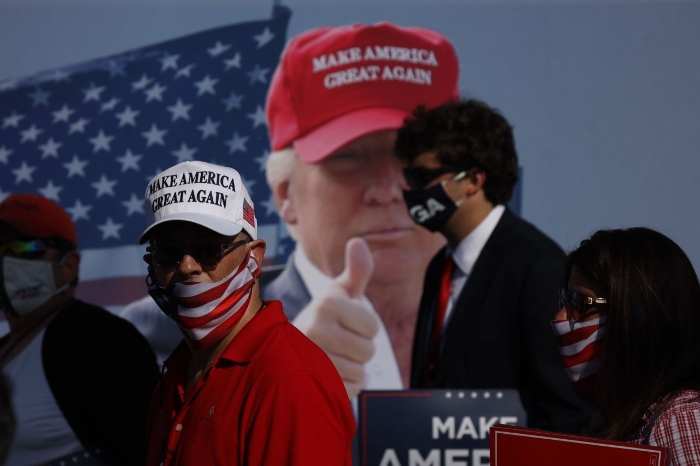
Supporters of President Donald Trump leave a rally while wearing masks at Mariotti Building Products in Old Forge, Pa. Only a limited number of supporters were allowed into the outdoor venue. | M. Scott Mahaskey | POLITICO | | | ONE PLAN, TWO AMERICAS — Biden is preparing to take office in January with a unified national plan to defeat Covid-19, but should he win the presidency, he would not have a unified nation ready to follow him, health care reporter Alice Miranda Ollstein writes. Large swaths of Americans, suspicious that the coronavirus threat is being exaggerated to harm Trump’s re-election prospects, are likely to resist a new Democratic president’s more aggressive public health measures. And many Americans are skeptical of a vaccine that may or may not be available next year. Depending on what happens in November, Biden could face a Republican Senate, with its own agenda and approach, or a closely divided Democratic one, with little room to maneuver. There are also big unknowns about the transition, whether a defeated Trump would have his administration collaborate from November to January to ensure a smooth handoff, or whether he would withhold access and information until Biden is sworn in Jan. 20. Biden’s allies wonder, too, whether Trump or his supporters would inflame conservative backlash against masks and other measures that Biden would promote. Biden’s team says his approach to the virus would rely on science, outreach and consistency. The policies have been under development since the early days of the pandemic, when Biden started pulling together a team of veteran public health officials and disease experts — many of whom he had worked with in the Obama administration on Ebola, Zika and the H1N1 flu. As the coronavirus surged over the summer, Biden kept retooling and expanding his pandemic plans, adding guidance on what the federal government should do to address racial disparities, reopen schools and distribute a vaccine. But even in the best-case scenario, with an effective vaccine and enough of the population willing to take it, the virus is still likely to dominate at least the early stages of a Biden presidency.
| |
| | PLUG IN WITH PLAYBOOK AT THE DNC : Join POLITICO Playbook Co-authors Anna Palmer and Jake Sherman from Aug. 18 to 20 for "Plug in with Playbook," our new political show making its virtual debut at this year's conventions. Get the latest developments on presumptive nominee Joe Biden's campaign, analysis of down-ballot races, a look at this cycle’s swing states, along with other election-related updates. Featured guests include DNC chair Tom Perez, convention CEO Joe Solmonese, Biden campaign senior adviser Symone Sanders, Sen. Tim Kaine (D-Va.) and others. WATCH LIVE. | | | | | | | POLL POSITION — In most polls, Biden has a significant lead over Trump. But four years ago, Hillary Clinton also had an August lead. Her Election Day loss in the Electoral College stunned most observers. Your host talked to POLITICO polling guru Steve Shepard over Slack about what the polls might be missing this time around, whether candidates can expect a convention bounce and to try to get him to admit that polls aren’t perfect. This conversation has been edited. Are there aspects of the race that the polls are missing? Traditionally, after Labor Day, public pollsters make an important change in their methodologies: They try to figure who is going to vote, and who isn't. Flipping that switch to figuring out who is a certain or likely voter is always difficult. There's one reason why it might not be as big of an issue this year: Poll after poll shows unprecedented interest and enthusiasm in this election. But at the same time, between coronavirus — and who knows what that's going to look like come the fall? — and some of the issues we’ve seen lately with mail ballots, there are new and different questions about getting the right mix of voters in your poll to reflect the eventual electorate that participates. Still, a lot of people I speak with who voted for Trump in 2016 might have soured on him, but they will still vote for him over Biden. They just might not tell a pollster. There’s been a lot of research into whether there is a significant share of Trump voters who are lying to pollsters about their support for the president because they see it as a socially undesirable answer. Most of those studies show it’s not a factor. To the extent Trump outperformed his 2016 polling on Election Day, it was because late-deciders moved toward him, people who said they hadn't made up their mind in pre-election polls. Some Republican pollsters will dispute that, and one election is a small sample size to prove any effect does or does not exist. But I would note that polls this year show there are fewer undecided voters or people who indicate in polls they will vote for a third-party candidate. Expecting any kind of convention bounce for Biden? The huge convention bounces of decades ago appear to be a thing of the past. And I think that with President Trump’s extraordinarily stable (and low) approval ratings over the past three and a half years, there just isn’t much room for the electorate to move between the two candidates. Can’t you admit that polls aren’t perfect!! Of course! But without polling, everyday Americans would only get to tell their leaders and the rest of the country what they think about them and the issues facing the nation every two or four years. One thing I’ve come to believe more and more in recent years in journalism is that we need to listen to people more. Polls are a great way — the best way — to do that. Badgering the voters — The New Swing State Map heads to Wisconsin, a state Democrats feel the Clinton campaign muffed in 2016. Charlie, Eugene Daniels and Natasha Korecki discuss the keys to winning the crucial Midwestern state, including Milwaukee’s suburban counties and its Obama-Trump voters.
| 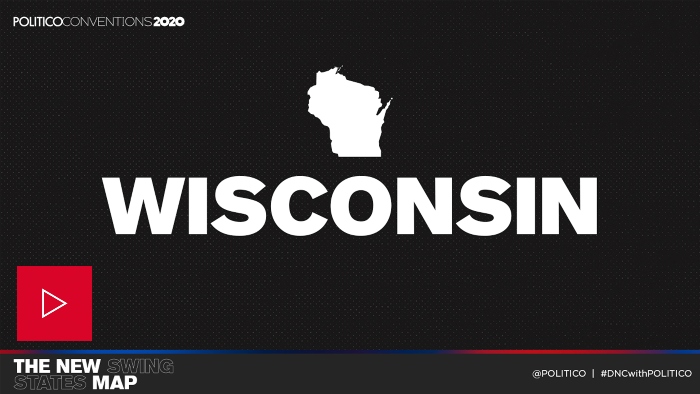
| ‘Competing impulses’ — Former Biden chief economic adviser Jared Bernstein said economic conditions would determine whether a Biden administration raised taxes in its first year in office. “Biden is extremely committed to pay-fors for his permanent initiatives,” Bernstein told chief economic correspondent Ben White today.
| 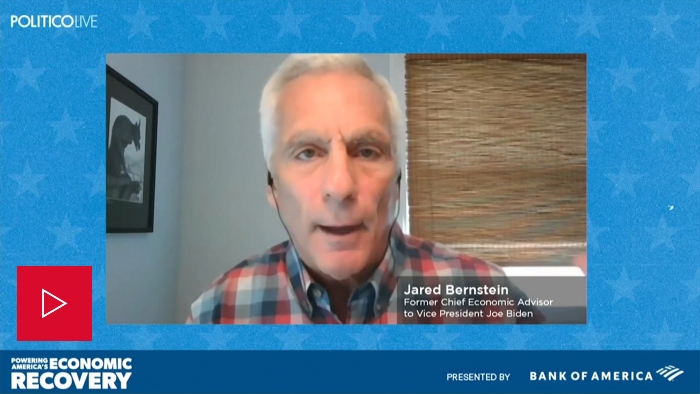
| | | Nightly asked you: How have your convention viewing plans shifted with the changes in format and location? Do you plan on watching more or less? Do you have any traditions that you've had to alter or cancel? Send us your thoughts, and we'll include select responses in Friday's edition.
| | 5 POSTAL CRISIS MYTHS — Everyone seems to be worried about the U.S. Postal Service. Mail delays during Covid-19 are stoking fears that the agency is collapsing right when we need it most. Then Trump stoked even bigger fears by telling Fox Business News that he might deliberately starve the post office of money to block mail-in voting. The Postal Service is the nation’s favorite federal agency, and even Trump seemed to realize he’d overstepped; he soon tweeted “SAVE THE POST OFFICE!” People aren’t wrong to worry, Kevin Kosar writes for POLITICO Magazine: The Postal Service really does have big problems, and it really will be central to the election this year. The problems just aren’t the ones everyone is panicking about. Here’s what’s really going on with the 240-year-old agency.
| |
| | 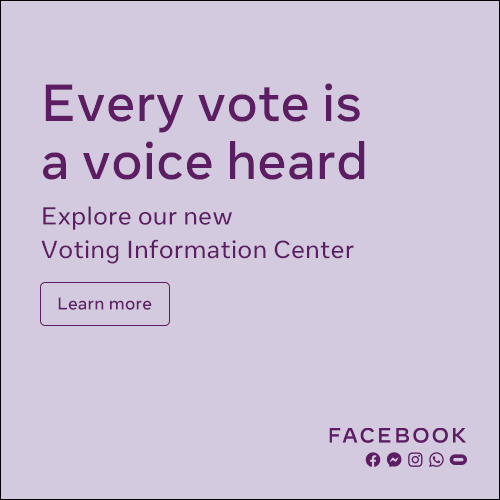 
| | | | | PENTAGON HEALTH HICCUPS — Earlier this week, POLITICO reported that the Pentagon was considering cutting military health care by more than $2 billion in the middle of the pandemic. Then, Trump jumped in and tweeted that the proposal “has been firmly and totally rejected by me.” In the latest POLITICO Dispatch, Lara Seligman and Dan Diamond discuss how they broke the story — and what it’s like to have the president confirm your reporting.
| | | | | |
7,424 The number of days of Navy maintenance delays at four shipyards for vessels with completion dates between fiscal 2015 and 2019, according to the Government Accountability Office. Military readiness and the time sailors have to train on aircraft carriers and submarines are taking a hit, the government watchdog found today. (h/t Sarah Cammarata) |
| | | OPENING SHOT — The Kremlin shocked and excited the world when it announced that it had already created and approved a coronavirus vaccine, with Russian President Vladimir Putin’s daughter among those inoculated. The U.S. stock markets spiked briefly on the news. Western media, however, quickly rained on Russia’s parade by pointing out that the vaccine’s creator, Moscow’s Gamaleya Research Institute, hadn’t been transparent about its testing process. The vaccine hadn’t completed Phase III trials, and Gamaleya has never made public its Phase I and II testing. At home in Russia, the reaction has been equally mixed, Vijai Maheshwari writes. The development of the vaccine — named Sputnik V, an allusion to the Soviet Union’s glory days during the space race — is a major PR victory for Moscow. Local media sites were quick to celebrate with headlines like “Russian vaccine and Putin’s daughter win over Global Media.” Yet, even as many common Russians professed pride in the achievements of their scientists, the medical community is a lot more skeptical. A recent poll shows that 1 in 2 doctors have reservations about the inoculation, with two-thirds concerned about insufficient data proving its effectiveness, and others worried that it was developed “too fast.”
| |
| | INTRODUCING POLITICO MINUTES: An unprecedented campaign season demands an unconventional approach to news coverage. POLITICO Minutes is a new, interactive content experience that reveals the top takeaways you need to know in an easy-to-digest, swipeable format delivered straight to your inbox. Get a breakdown of what's been learned so far, why it matters, and what to watch for going forward. Sign up for POLITICO Minutes, launching at the 2020 Conventions. | | | | | | | | 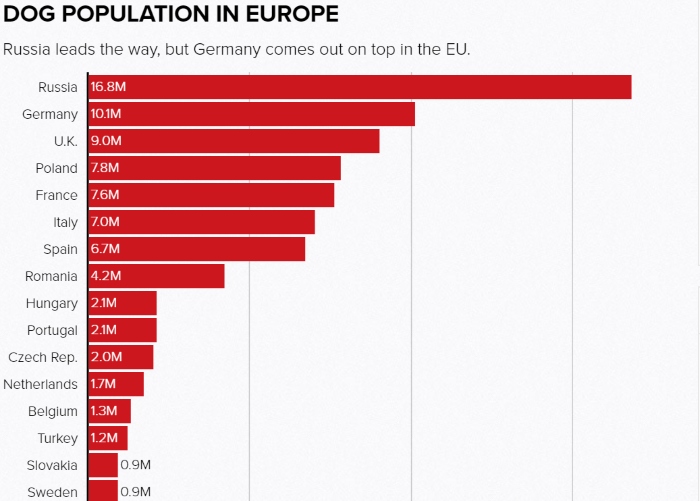
Fediaf | POLITICO | BERLIN’S DOG DAYS OF SUMMER — Germany is set to outlaw the quick after-dinner walk around the block with the dog. In draft legislation unveiled this week, dog owners in Germany will need to make sure they walk their canine pet twice a day for at least an hour in total as part of reforms to animal welfare rules. The aim is to make life better for the country's millions of house-trained dogs, but not everyone is happy, Joshua Posaner and Nette Nöstlinger write. A commentary in tabloid Bild described the plan as "the most insane idea that a ministry has ever come up with in living memory," questioning whether such a system is even enforceable. “The idea is good, it's dog-friendly," said Karin Revolter, out walking her Maltese dog in Berlin’s central Tiergarten park today. “But yes, how should you control it, that's difficult. I go for a walk with my dog five times a day, it needs it. “I also know some, here in Berlin, who don't go out with the dog often enough,” she added.
| |
| | A message from Facebook: How Facebook is preparing for the US 2020 election
— Launched new Voting Information Center
— More than tripled our safety and security teams to 35,000 people
— Implemented 5-step political ad verification
— Providing greater political ad transparency
Learn about these efforts and more. | | | Did someone forward this email to you? Sign up here. | |
|
| | Follow us on Twitter | | | FOLLOW US | | |
| |

No comments:
Post a Comment
Note: Only a member of this blog may post a comment.